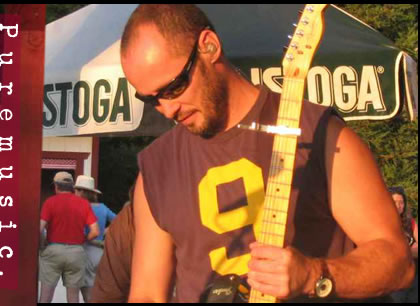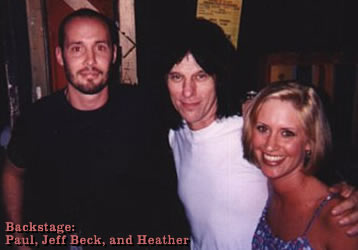
A Conversation with Paul Thorn (continued)
PT: I mean, 1,500, 2,000--yeah, he's got solid career. He makes good money. He's well-respected. He sells a quality product. And he can go in Wal-Mart and probably not get recognized.
PM: Probably not.
PT: So he's got the best of both worlds.
PM: People have no idea how much money John Prine is making, but it's a lot of money.
PT: Well, in the end, we don't want to worship money--but at the same time, we all dream of giving our children nice things, we all dream of having a nice home we can live in the rest of our lives. And that's good.
PM: Yeah, and just do whatever the hell we want, right?
PT: Yeah, yeah. But that's what I'm shooting for. I mean, if some fluke happened and I was going to become a household name, I guess I could deal with it. [laughs] But in realistic terms, I'm shooting for a long career like somebody like John, where it's quality music, nobody tells him what he's got to write, nobody tells him where to stand, nobody tells him what outfit to put on. He just goes out there and be's hisself.
PM: Yep.
PT: And that's what I'm shooting for. And as I said, every year I get closer and closer. And it's just my crowds are getting bigger. And from a business standpoint, the money is getting bigger, and I'm in a real good place. I feel like I am.
PM: That was a damn big crowd in that video, I'll say that.
PT: Yeah. It was good.
PM: Where was that in, Birmingham?
PT: That was in Birmingham. Yeah, it took a while, but it's getting to where, I don't know, 75% of everywhere we go now we've got big crowds. We've still got skinny markets, but for the most part we can go into a lot of cities now and pull a crowd. And that really took a while to do that, but we did it by, you know, we'll go into a city, say, like, Cincinnati, and maybe a smaller crowd will come in. But at that particular show, we'll pass the mailing list through the crowd, and everybody will sign the mailing list. And then over a period of time continuing to come back to the same markets, we'll send people e-mails telling them when we're coming into their town. They tell their friends, and then the next time we come back, we've got twice as many people. And you start perpetuating it, and eventually if you work at it hard enough, you've got a following. And for somebody who doesn't have Britney Spears' publicity, I think that is going to be the career of the future, where artists can have careers by working their mailing list, building their website up. We've got our mailing list up to over 20,000 people.
PM: Damn!
PT: And so for just a small little thing, we're real proud of that. We worked hard for every name. And we're looking for avenues. And even like this webzine--I looked at your webzine the other night, and it's such a cool thing to be a little part of that, too.
PM: Thanks, we're happy to have you.
PT: And get a little shout out on there for our website, because you get a lot more hits than ours does. [Hey now, y'all go check out www.paulthorn.com when you're done, right?]
PM: Yeah, hella people will come and check you out, and we'll be touting you as one of the most important indie artists out there.
PT: Well, thanks, man. I appreciate it. Like I said, I'm just trying to get my kids some name-brand tennis shoes so they won't get laughed at when they go to school.
[laughter]
PM: Hey, how about the lady in your painting that says "One of the greatest joys in my life is having coffee with the woman I love"? Is she still the one?
PT: Oh yeah! That's my wife.
PM: Let's talk about her. What's her name?
PT: Her name is Heather Marie Thorn.
PM: And how long have you guys been together?
PT: We've been together about eight years.
PM: Wow. So what's she like? How did you meet her? And what does she like to do?
PT: Oh, I met her through my uncle who was also my trainer when I boxed. And actually, she used to babysit Billy's kids.
PM: Wow.
PT: [laughs] She's ten years younger than me. And I married her ten years younger, because when I get old I wanted somebody to help me put my teeth in a glass every night, stuff like that. [laughs] She's real sweet. She works as a fitness therapist. She helps people work out and helps old people work out, gives people advice on fitness and stuff.
PM: Wow.
PT: Yeah, she has a job, and she's real supportive, got a good sense of humor. And she tolerates my Attention Deficit Disorder.
PM: [laughs] You an ADD guy?
PT: Yeah, just about all artists are. Me and my wife sometimes, she'll be telling me something, and I will realize halfway through the conversation that I have missed half of what she just said.
PM: Right.
PT: And she'll actually stop and she'll go, "What did I just say?" And I'll go, "Uh"--and I'll definitely try to make something up and hope it's right.
PM: [laughs]
PT: But half the time [laughs] I'm totally lost. Yeah.
PM: So do you guys really have kids, or were you just kidding when you said that about the sneakers?
PT: I have one child with my wife. And then I have another child from a previous relationship. I have a twelve-year-old and a two-year-old.
PM: Wow.

PM: So how much energy and time do you put into painting? I really like the art that I see on your site.
PT: Well, I do it all the time. I just had an art show that just ended. And I've got another art show just fixin' to begin. Sometimes I do it when I'm on the road. If I'm in an airplane, I'll draw on the airplane. And down time in the hotels, I'll draw in the hotel. And when I'm home, I paint. Do you know who the Reverend Howard Finster is?
PM: Sure.
PT: Well, he's the guy that got me into art. I got to meet Howard when I was alive. Howard sang in my wedding.
PM: Holy shite!
PT: Yeah, yeah. You know, when I saw Howard's art and met Howard, I noticed that his technical ability was kind of at the same level of a three-year-old. But his message, and what he believed in, he wanted people to understand what he believed so badly that he painted it, in hopes that it would sink in when people saw it visually. And so even though my beliefs and my vision isn't the same as Howard's, it sort of struck a nerve in me and made me want to say, well, Paul, you got something to say, too.
PM: Right.
PT: So I just started drawing these pictures. And I sort of emulated his style in a sense that I draw a picture, and then I write words around the picture, too, so there's no mistake about what the picture is about.
And Howard had a real basic message about, you know, live good, you're going to heaven, live bad, you're going to hell. And he believed in that real strong. My belief is a little bit different than that--well, we all meet up at the same place. Howard never really went out into the broader world. He had a real innocence about him, if you know what I mean.
PM: I do.
PT: And that's not to say stupid, that's just--I'm paying him a compliment. He just had this childlike charm and quality about his work.
PM: It's a precious thing.
PT: It is a precious thing. I've sort of been out in the world maybe a little more--I'm not saying I'm better, I'm just saying I got a different point of view and a different perspective. And so I'm just a little bit more worldly than Howard was. continue
print (pdf) listen to clips puremusic home